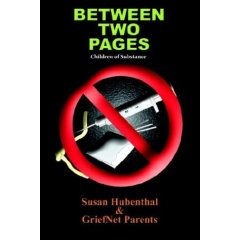DRCNet
Book
Review:
"Between
Two
Pages:
Children
of
Substance,"
by
Susan
Hubenthal
and
GriefNet
Parents
(2003,
1st
Books,
$22.95,
pb.)
5/19/06
Phillip S. Smith, Writer/Editor, [email protected], 5/19/06 For a parent, losing a child is one of the greatest and most bitter sorrows imaginable. Losing a child to a drug overdose or some other form of drug-related death is even worse. It is one thing -- and no less tragic -- if your child dies in a highway crash or a recreational accident or fighting for empire in some distant land, but the parents of teenagers and young adults who die as a result of drug use carry an extra burden of guilt and shame. They feel guilt over what they see as their failures as parents and nurturers and they feel shame because their kids died the ignominous death of the doper.
In the contemporary United States, it is all too easy to suffer alone. In a society where people often don't even know their neighbor's name, community ties are a thing of the past, and family ties are attenuated by distance and the pressures of making a living, going it alone is how it is done. The parents involved in the writing of "Between Two Pages" were different. Taking advantage of the nascent Internet, they found GriefNet, an online resource for people suffering various sorts of losses founded in 1994, and began to talk among themselves. "We are a collection of wounded parents whose children have died of a drug overdose or suicide related to drug use," writes Susan Hubenthal, whose son Kelly died of a heroin overdose in 1996. "We came together tenuously on a site called GriefNet, each one devastated by society's misplaced blame and guilt because we couldn't save our children, and filled with sorrow so deep we were unable to find life after death. Most of us have never met, yet we consider ourselves a family, crying together and comforting one another." There is little comfort to be found, only, for the most part, a gradual dulling of the pain. The loss of a child is a rip in the fabric of the universe that never goes away; an aching void always remains. Sometimes it turns a grieving parent into a bitter, misguided crusader, as is the case of Steven Steiner, whose son died of an Oxycontin overdose. After his son's death, Steiner formed Dads and Mad Moms Against Drug Dealers, got funding from Purdue Pharma, the company that makes the drug that killed his son, and began offering rewards for turning in street-level dealers and crusading against medical marijuana, of all things. Steiner's reaction is extreme, but not uncommon. It reflects parental fears about drugs and the safety of their children, and it is those fears, craftily encouraged and manipulated by demagogic politicians, that have made parent anti-drug groups some of the most powerful players in setting a repressive, criminalized drug policy. The parents in "Between Two Pages" have gotten beyond that. Yes, there is bitterness toward drug providers and toward the dead kids' drug-taking buddies, but the bitterness is leavened by an emerging understanding of the role of our drug policies -- from harsh drug laws to counterproductive drug "education" to an underfunded drug treatment system -- in creating the conditions in which their children lived -- and died. Which is not to say that the parents of "Between Two Pages" have become a cabal of drug reformers. Some have, but others have not. Some grapple with their loss at a very personal level, while others seek answers in the society in which they live. Jared Lowry died of a heroin overdose in Austin in 1997. His mother, Jennifer, recounted the circumstances of his downfall, his battle with drug use after his father's death, his eventual stint in rehab in Phoenix, and his death from an OD just weeks later. "Jared died because he made the mistake of experimenting with heroin and combining it with other drugs, and because he did so with people who feared repercussions if they sought help, and because he lives in the United States, which enshrouds itself in a false cloak of purity and turns its back on young people in search of answers," his mother wrote. Jennifer Lowry is one of the parents who channeled her grief outward. "I read all I could about death," she explained, before cancer claimed her own life a few years later. "I examined my feelings and the reasons for what happened. I've joined two drug policy reform groups and work actively to make changes so others may not have to go through what I am enduring." I think I can speak for all drug reformers when I say this is not the way we want to gain converts. But these parents have had to become acquainted with the issues surrounding drug policy, and it is only natural that some of them should find the status quo flawed and deadly. Why do the workers at methadone clinics treat their clients with such arbitrariness and disdain? one parent asks. Why wasn't treatment available? asks another. Why do we provide little but jail cells for drug users? asks yet another. Some of the kids profiled in "Between Two Pages" were problem kids. They had health or emotional issues. They were self-destructive. Or they were lost. They are the kids who needed help the most. A better, more humane drug policy may or may not have saved them, but our current drug policy clearly did not. "Between Two Pages" is not designed as a drug reform manifesto. It is instead a witness and testament to human tragedy and endurance, a compendium of pain and suffering, a therapeutic exercise. But while not a manifesto, reading it does make one want to change this cruel world.
|

